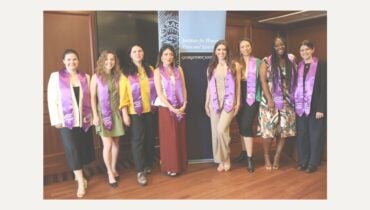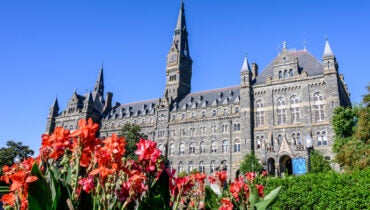Georgetown University offers a broad variety of graduate courses that teach students to critically engage with the most pressing issues of our time using a gender lens. In Spring 2024, many of such classes will be offered across the university—including several new classes.
Spring 2024 Graduate Courses
These graduate classes count towards the Georgetown Institute for Women, Peace and Security (GIWPS) Graduate Certificate in Gender, Peace and Security.
Gender, International Security and Development (MSFS 5600 / GOVT 5669; CRN: 38311)
Professor: S. Ayse Kadayifci-Orellana
Time: Monday, 2:00 p.m. – 4:30 p.m.
This class contextualizes gender issues and asks the question: how would we think about international peace, security, development approaches, and design intervention strategies if gender was treated as a central consideration in international affairs and peacebuilding programming? To answer this question, the class will explore both conceptual considerations related to gender and its practical application. This is a required course for the Gender, Peace and Security certificate.
Gender and Security Toolkit (SEST-6699; CRN: 46208)
Professor: Aapta Garg
Time: Tuesday, 5:00 p.m. – 7:30 p.m.
This advanced seminar will teach you concrete skills for ensuring gender is considered in peacebuilding, security, and development fields. The course will explore critical skills—from gender mainstreaming and gender analysis to gender-sensitive budgeting, research, monitoring & evaluation, and advocacy. The course will enable students to capably serve as gender focal points and learn how practitioners have successfully advanced gender in their diplomacy, development, and defense work. This is a required course for the certificate.
Women & Gender in the Arab World (ARST-6532; CRN: 45458)
Professor: Fida Adely
Time: Tuesday, 3:30 p.m. – 6:00 p.m.
No issue related to the Arab world has garnered more attention than the status of women. This course will situate current preoccupations with women in the Arab world in historical and comparative perspectives, and within broader theoretical debates about gender and sexuality. Drawing on a variety of disciplines, we will consider the ways in which class, ethnicity, geography, religion, and culture shape the status, experiences, and desires of women in the region. Moving beyond a focus on women, we will also consider how conceptions of femininity and masculinity are constructed over time, and how in turn these concepts shape ideas about love, family, politics, and appropriate gender relations. Finally, the course will also situate the fields of women and gender studies in the Arab world in the larger debates and shifts within feminist theory, examining the ways in which scholarship in and about the region has emerged in conversation with broader feminist theories and projects.
This course is a graduate level seminar. Advanced level undergraduates will be considered for enrollment in the course.
Diversity & Inclusion in CR/Dev (MSFS 7620 / GOVT 8404; CRN: 46063)
Professor: Carla Koppell & Claudia Youakim
Time: Thursday, 5:00 p.m. – 7:30 p.m.
Untapped power: Leveraging diversity and inclusion in conflict resolution and development. A substantial body of research underlines the need to attend to diversity and inclusion in diplomacy, development and conflict resolution. Numerous international resolutions, national laws and plans, and declarations of commitment are in place calling for attention to and equal treatment of ethnic and religious minorities, women, youth, members of the LGBT community, people with disabilities, as well as socio-economically marginalized groups. Yet, realization of the commitments sorely lags behind the rhetoric. This seminar will review how diversity and inclusion are important to peace and prosperity, and discuss progress advancing the agenda and barriers to advancement. The class will also provide analytical and practical tools for advancing diversity and inclusion in the practice of diplomacy, conflict resolution and international development.
Gender and Terrorism (SEST 6544 ; CRN: 43616)
Professor: Devorah Margolin
Time: Thursday, 5:00 p.m. – 7:30 p.m.
Women have often been overlooked and understudied within violent extremist movements. From Sri Lanka’s Tamil Tigers to Chechnya’s Black Widows to the Al Khansaa Brigade of ISIS, women have played critical roles in terrorist organizations across the globe for decades. As men often take on more prominent and violent roles within terrorist groups, women’s contributions to violent extremism can often be underplayed, underexplored, and misunderstood. From theoretical foundations to policy implications, this course will address pressing terrorism threats to national and international security with an often overlooked gender lens. This course will explore how groups use gender dynamics to recruit, mobilize, and utilize men and women for their own strategic advantages. By better understanding women’s participation and gender dynamics in violent extremism, academics and practitioners are better able to leverage this knowledge into well-informed policy and actionable strategies to counter and combat it.
Conflict-Related Sexual Violence (SEST 6697; CRN: 44327)
Professor: Robert U. Nagel
Time: Monday, 5:00 p.m. – 7:30 p.m.
This course examines the causes and consequences of conflict-related sexual violence as well as the legal frameworks and policies governments and international organizations pursue to prevent, mitigate, and respond to conflict-related sexual violence. Throughout the course, we will engage with gender, race, and class as fundamental organizing principles that shape the creation of legal and normative human rights frameworks as well as their practical application.
Women & Leadership (PPOL-633; CRN: 32454)
Professor: Anne Cammisa
Time: Thursday, 9:30 a.m. – 12:00 p.m.
This course examines the unique challenges and opportunities faced by women policymakers in leadership positions in government, non-profit organizations, business and the military. The course examines women’s policy-making and leadership roles in the context of the general literature on leadership. We will examine theories of leadership and women leaders in historical context and will look at case studies of past and present women leaders. While the course will primarily focus on the United States, women’s leadership roles in other countries will be discussed as well.
Gender & War (SEST-6698; CRN: 43655)
Professor: Amanda Van Dort
Time: Wednesday, 6:30 p.m. – 9:00 p.m.
This course provides an introduction to understanding the gendered dimensions of armed conflict and its aftermath. The course will introduce students to gender theory which can be used as a framing theory to understand war and conflict, as well as a tactic used by armed actors in conflict. The course will provide a grounding in selected thematic issues relevant to the study of security and military action such as gendered frames for understanding militarism and combativeness, gender-based violence related to conflict, humanitarian response, and gendered approaches to understanding the aftermath of conflict, such as transitional justice measures and peacekeeping operations. The course is designed to combine theoretical and practice-based approaches to issues of gender and conflict, drawing from interdisciplinary theoretical and policy resources, as well as case studies from differing situations of armed conflict globally.
Gender, Climate and Security (PPOL-6406 1; CRN: 46429)
Professor: Marisa O. Ensor
Time: Wednesday, 3:30 p.m. – 6:00 p.m.
Gender dynamics, climate change, and security considerations are interconnected in complex and impactful ways. The real-world implications of the so-called “gender-climate-security nexus” for the promotion of gender equity, the mitigation of climate change, and the advancement of peace and security are increasingly being recognized. This seminar examines the key concepts, theories, and approaches underpinning the field of Gender, Climate and Security from scholarship, policy, and practice perspectives. The course will cover issues such as intersectionality, gendered climate security in the Global South, masculinities, ecofeminism and environmental justice, the securitization of the environment, climate (in)security and environmental disasters, migration as a climate change adaptation strategy, and environmental peacebuilding. Discussions and materials will also cover the emergence of legal and normative frameworks adopted by the UN system to address these issues. Case studies will illustrate how the connections between intersectional gender, climate and security are being experienced in specific locations across the globe.
Queering International Development (GHDP-6648; CRN: 44258)
Professors: Fabrice Houdart & Caroline Vagneron
Time: Tuesday 05:00 PM – 07:30 PM
NB: This course is only 1.5 credits.
How do we address social and economic exclusion and leave no one behind? This module will discuss the well-being of LGBTQ+ people around the world and strategies and approaches for promoting their inclusion. Despite some legal and social advances in the past two decades for segments of the broader lesbian, gay, bisexual, transgender, and queer (LGBTQ+) community, many LGBTQ+ people continue to face widespread poverty, discrimination and violence in many countries around the world. Tackling these issues is challenging but the Sustainable Development Goals’s principle of ‘leaving no one behind’ and WBG Twin Goals of promoting shared prosperity and ending extreme poverty offer a path for action.
Undergraduate DEI Courses
In addition to graduate courses, the University also offers a large variety of undergraduate classes engaging with gender and other Diversity, Equity, & Inclusion (DEI) topics. For undergraduate students who are interested in learning about how gender, race, class, religion, and other identities intersect with the world around them, we recommend these classes as a starting point, though Georgetown offers many wonderful options.
- Race, Racism, & Digital Tech, Professor Brienne Adams (CRN: 45533)
- Race, Gen, Col in LatAm & Carib, Professor Melanie White (CRN: 45537)
- Race & Color in Latin America, Professor Andrea Huezo (CRN: 45870)
- Economics of Diversity, Professor Lidia Ceriani (CRN: 43023)
- Women and Politics, Professor Michele Swers (CRN: 45945)
- Race, Gender, and American Pol, Professor Nadia Brown (CRN: 42885)
- Gender & Education in ME, Professor Nadya Sbaiti (CRN: 46694)
- Diverse Voices in Frgn Affairs, Professor Carla Koppell (CRN: 38650)
- Gender, Race, & Taste in Media, Professor Kelly Coyne (CRN: 45653)
- Language, Gender, & Sexuality, Professor Nadja Tadic (CRN: 46552)
- Gender, Env & Sustainability, Professor Patricia Biermayr-Jenzano (CRN: 46168)
- Labor/Sexuality/Globalization, Professor You-me Park (CRN: 38833)
- Gender & Sexuality in the MidEast, Professor Safoura Nourbakhsh (CRN: 45571)
- Black Women & Politics of Care, Professor Melanie White (CRN: 45904)
- Women, Poverty & Reproduction, Professor Tricia Hoefling (CRN: 45573)
- Gender and Political Campaigns, Professor Donna Brazile (CRN: 45574)
- Gender and Sustainability, Professor Patricia Biermayr-Jenzano (CRN: 40901)
- Intro to Disability Studies, Professor Lydia Brown (CRN: 45465)
- Crip/Mad/Queer Narratives, Professor Lydia Brown (CRN: 45414)
- Intro to Black Digital Studies, Professor Brienne Adams (CRN: 45530)
- Race & Radical Feminisms, Professor Rosemary Ndubuizu (CRN: 42232)
- Race in Internat’l Relations, Professor Desh Girod (CRN: 45941)
- Race, Religion, and Terrorism, Professor Edmund Husain (CRN: 44189)
- IR and Race, Professor Eboni Haynes (CRN: 46258)


